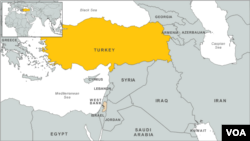The Turkish government is considering including a Kurdish Islamist party in its off-and-on peace talks with the county’s main Kurdish separatist party, the Kurdistan’s Workers’ Party (PKK) - this is setting the scene for the revival of an old and deadly feud.
Known as Huda-Par, the Free Cause Party is an offshoot of the violent Kurdish Hizbullah group that was locked in a power struggle with the PKK in the 1990s that saw hundreds killed in assassinations and bombings, mainly in southern Turkey. Ideologically the two are worlds apart. The PKK is secular and leftist, while Huda-Par is Islamist.
“The government may hold talks with the PKK to make it lay down arms and may eventually succeed, but if it wants to settle the Kurdish question in general, all Kurdish segments should be interlocutors,” according to Huda-Par spokesman Sait Sahin.
Turkish government officials are expressing increasing sympathy with that argument, as is the pro-government media. The deputy prime minister in Turkey’s Islamist government, Bulent Arinc, met recently with Huda-Par leaders. After dubbing them “devout Kurdish friends” praised their program saying it is extremely important. “This party has a lot to say, both about the country’s problems and the [Kurdish] settlement issue.”
PKK officials dismiss the idea of including Huda-Par in negotiations, insisting they should be seen as the main representative of Turkey’s 14 million Kurds, who make up about 18 percent of Turkey’s population. A Turkish official, who declined to be identified for this article, says, “Huda-Par has a legitimate right to have its views included in any settlement, and we are considering how that can be done.”
PKK on guard
The PKK harbors a deep suspicion of the government’s motives in flirting with their rivals now.
Back in the 1990s when there was an all-out war between the PKK and the Turkish state, there were claims that Kurdish Hizbullah, which has no ties to the Lebanese Shi'ite movement Hezbollah but was also nurtured in its early days by Iran, was being directed by Turkish security forces to carry out extrajudicial killings in southeast Turkey. PKK fighters branded their rivals “contras” after the CIA-backed Nicaraguan rebel groups, claiming they were being used by Turkey’s military intelligence service as saboteurs of the Kurdish separatist insurgency, which began in 1984.
In 1992, Turkish journalist Halit Güngen was murdered after alleging links between Kurdish Hizbullah and Turkish intelligence, which he claimed included military training and the use of shooting ranges.
Legal party
After the Hizbullah's leader Huseyin Velioglu was killed in a police raid in Istanbul in 2000 - a few weeks after the capture of PKK leader Abdullah Ocalan - the group reorganized itself and made a political comeback setting up Huda-Par as a legal political party. In municipal polls last year, the party secured nearly eight percent of the vote in the southeastern town of Batman and just more than four percent in Diyarbakir.
Some analysts say the promoting of Huda-Par by Turkish President Recep Tayyip Erdogan’s ruling Development and Justice Party (AKP) has little to do with the faltering peace talks and is a sly tactic to undermine the vote of the pro-PKK People’s Democratic Party (HDP) in June’s parliamentary elections.
The polls in are crucial for Erdogan, who needs to maximize a parliamentary majority in order to enact a touted constitutional reform that would shift the country to a presidential political system and strengthen his powers. That would be easier, if the HDP fails to reach a 10 percent threshold to secure seats.
Whatever the reason for the promotion of Huda-Par by government ministers, for wider electoral purposes or to wrong-foot the PKK in peace negotiations that have dragged on for nearly three years, it is adding to tensions among rival Kurds.
In October, Huda-Par members battled PKK supporters who were staging violent protests across southeast Turkey against the Turkish government’s decision not to intervene to lift an Islamic militant siege of the Syrian Kurdish town of Kobani. In Diyarbakır, party members shot at pro-PKK protesters, killing two, according to local police.
Diyarbakir Mayor Gultan Kisanak labeled those shootings as the “government’s Plan B,” which he alleged was to discipline the PKK and to make clear that Kurdish protests and threats would be met by strong arm tactics.
Tensions rise
But the violence appears to be a two-way street. Twitter accounts associated with the youth wing of the PKK have been urging supporters to attack Huda-Par, and PKK activists are suspected of being behind a gun attack in October in the eastern city of Bingol that led to the deaths of six people, including two policemen.
During the past few weeks there have been frequent clashes between rival Kurds in the southeastern town of Cizre. On December 27, four people died in fighting in a Huda-Par dominated neighborhood. Residents in the town say shooting erupts most nights and armored police vehicles mount patrols around-the-clock. On January 6, a 14-year-old boy was killed when police opened fire in the Sur neighborhood.
“Nobody knows the reasons [for this unrest] ... but step by step things are getting out of control,” Hüseyin Yayman reported from Cizre for the pro-government daily newspaper Vatan.
Unrest in southeast Turkey appears to be linked to a string of rudimentary explosive devices found recently across Istanbul, police allege. A Twitter account purportedly from the youth wing of the outlawed PKK claimed the bombs were left “to take revenge for the Cizre massacres.”











